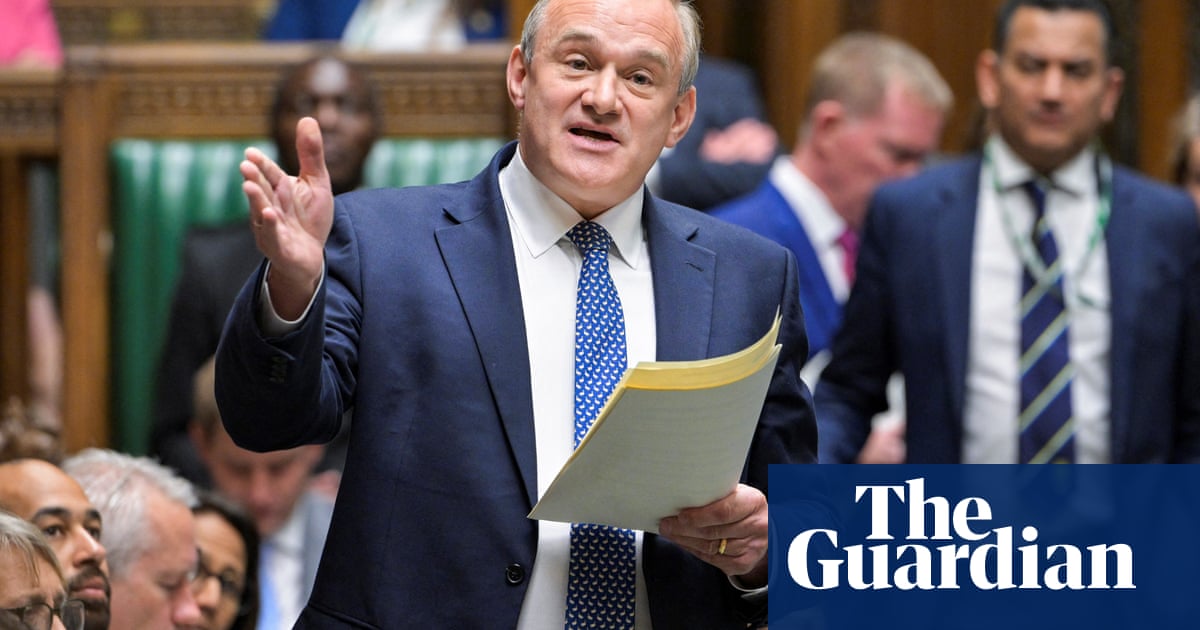TheLiberal Democratshave set up an internal “Reform watch” system to monitor Nigel Farage’s party in local government, with Ed Davey saying Labour and the Conservatives are too scared of the threat from Reform to hold it to account.
The Lib Dem leader defended his party’s performance in last week’s local elections, saying council contests where they unexpectedly ended up behind Reform mainly happened because of a collapse in votes for other parties.
As well as gaining more than 160 councillors and taking control of three new councils, the Lib Dems are the biggest party in three others, and in four areas came second to Reform – which will be the core of the monitoring project, intended to scrutinise Reform’s mayors as well as councils.
It is being spearheaded by Amanda Hopgood, the leader of the opposition group in the Reform-runCounty Durham, along with Antony Hook, who performs the same role in Kent, and Mike Ross, the leader of Hull city council, who came second to Reform’s Luke Campbell to be mayor of Hull and East Yorkshire.
A key part of the monitoring will be to see if and how Reform-run councils try to cut services, Davey said. Many families had been “alarmed” byFarage’s commentssaying too many people were being diagnosed with special needs or mental illnesses, he said.
Other areas would include culture war battles, such as Reform barring councils from flying the Ukraine flag as a show of solidarity, and trying to cut back on climate and net zero-related work.
Davey said: “When you look at what councils do on climate change, the vast bulk of the work is insulating people’s homes. So isNigel Farageessentially going to say to less well-off people: ‘We’re not insulating your home, you can pay higher energy bills, and that we’re pleased about that because that can make climate change worse.’ Is that the Reform position?”
Davey aims to present his party as “the antidote to Reform”, an extension ofits bullish stanceon opposing Donald Trump, where Labour and the Conservatives are more cautious.
He said: “We’re going to take the fight to them, whether it’s exposing the fact that Farage is a huge cheerleader for Donald Trump and wants money from Elon Musk, all those sorts of things.”
While the Lib Dems performed well in the local elections, they lost out to Reform in some key areas, for example theHulland East Yorkshire mayoralty. Similarly, while they achieved their target of removing Warwickshire council from Tory control, this involved finishing a fairly distant second to Reform.
Sign up toFirst Edition
Our morning email breaks down the key stories of the day, telling you what’s happening and why it matters
after newsletter promotion
Davey said this did not mean they had underperformed. “We were expecting to do very well in south Warwickshire, which we did. In North Yorkshire, we weren’t expecting to do that well. It wasLabourand Tories’ failures that let Reform in. They didn’t make any progress in our areas. Where we were really active, Reform were put in their place.”
Another complication, he said, was the fragmentation from very close multiparty contests, which in one instance meant the Lib Dems won a council seat on less than 19% of the total vote.
While Reform did not as yet seem to be parking any tanks on Lib Dem electoral lawns, this did not mean it would not happen, Davey said. “We’re not complacent. We don’t think the fight against Reform is going to be necessarily easy,” he said.
“Are we worried about the rise of Reform. Of course we are. The question is, what’s the best way to respond to that? And I don’t think it’s to copy them. I think it’s to tackle them head on. From what I can see, we’re the only party who seem to be up for that. The others seem to be a bit afraid of them.”
